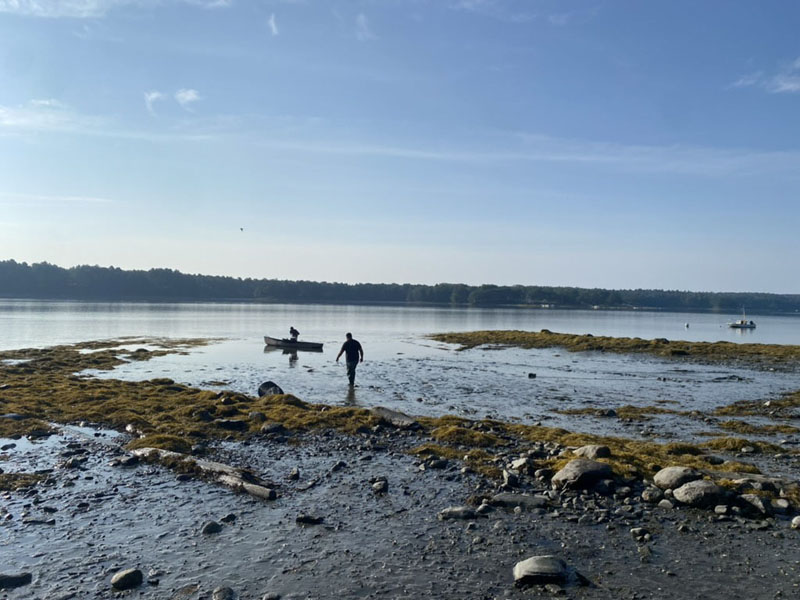
Shellfish harvesting is a major industry in coastal Maine, but factors like warming waters and pollution threaten its future, said Dartmouth environmental science student and researcher Rachel Freer. She has designed a survey to understand more about harvesters’ approach to shellfish conservation. (Photo courtesy Rachel Freer)
With the input of shellfish harvesters from Waldoboro and other towns in coastal Maine, Dartmouth environmental science student and researcher Rachel Freer hopes to understand how people in coastal communities approach marine conservation.
Freer became interested in the Maine shellfish industry last summer when she spent three months traveling across the state to observe how individuals and agencies manage the complex ecosystems and rich natural resources that the state has to offer.
The shellfish co-management system at play in Maine was particularly interesting to Freer, she said, because of its diversity.
In Maine, the Department of Marine Resources works with individual municipalities to regulate the harvesting and conservation of shellfish. With over 70 municipalities participating in the program, each one with a slightly different approach to shellfish management, the co-management system is a unique opportunity to compare different conservation strategies, said Freer.
Municipal involvement in shellfish conservation varies widely, with some towns simply limiting the number of permits granted and others engaging in more complex management practices.
Waldoboro is one municipality with a particularly involved approach to shellfish conservation.
Conserving shellfish is important, said shellfish warden Justin Hills, because harvesting is the town’s “leading industry.” With over 130 licensed diggers, Waldoboro “is one of, if not the biggest” clamming hotspots in the state of Maine, he said.
Waldoboro Shellfish Conservation Committee chair Abden Simmons said promoting shoreline cleanups to keep the environment healthy and limiting the number of licenses distributed by the town are just a few examples of the steps Waldoboro has taken to protect its shellfish resource.
“We’ve been very proactive,” he said.
Much of the richness of Waldoboro’s shellfish resource can also be attributed to the choices made by individual harvesters, said Simmons. One example of this is the wide use of hoe-digging harvesting in Waldoboro. Hoe-digging aerates the mud more effectively than does the alternative method of picking, perhaps creating a more hospitable environment for shellfish and helping to sustain their populations, he said.
The involvement of the Waldoboro municipal government and of individual harvesters in shellfish conservation is interesting to Freer, who is hoping to learn more about how shellfish harvesters themselves feel about conservation programs promoted by the town or state.
“I’m looking into motivations for stewardship, and what motivates people to participate in altruistic acts surrounding resource management,” she said.
That means asking whether management practices undertaken by municipalities and the state are effectively “reinforcing the work that the harvesters are doing to conserve the mudflats they’re working on,” Freer said.
For her senior thesis project, Freer has written a survey that she hopes shellfish harvesters from across the state will fill out. With the results, she hopes to understand how harvesters relate to efforts by entities like shellfish committees and shellfish wardens to promote conservation.
Freer hopes to determine whether governmental involvement is as positive and effective as municipalities intend or if it may “at times feel restrictive or ineffective,” she said. This is important to Freer.
“The rate that the environment and ecosystem are changing in the Gulf of Maine … I’m worried about the resilience of some communities that are very dependent on these marine resources for their economy and for their culture,” Freer said.
Pollution and climate change are a few examples of the threats that Freer worries could harm shellfish populations and those that depend upon them. Effective conservation, she said, is an important step towards preserving coastal economies, and the livelihoods and happiness of harvesters, in the face of these threats.
Freer hopes her research will add to knowledge about how shellfish harvesters and others who make a living off of natural resources can best collaborate with larger entities like municipal and state governments to conserve their livelihoods and the environment.
A vital part of this process, said Freer, has been engaging with the coastal communities themselves. Freer traveled up and down the coast of Maine last summer, speaking with shellfish harvesters, wardens, committee members, and other stakeholders about the issues they deal with on a day-to-day basis.
“I’m just trying to listen to as many people as possible,” said Freer. “I know that I’m naïve.”
Freer encourages all Maine shellfish harvesters to share their thoughts by taking the survey, which is available online at bit.ly/MEshellfish and will also be distributed at the next meeting of the Waldoboro Shellfish Conservation Committee, at 6 p.m. on Thursday, Dec. 7 in the Waldoboro municipal building.



